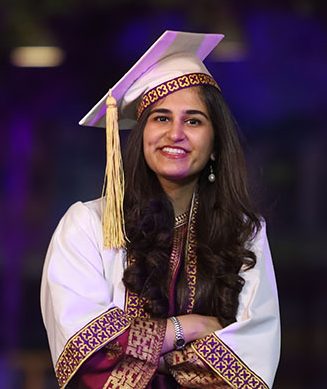
MAIRAH KHAN
Aspiration Statement
I am interested in Urban Planning and Public Policy and would like to make a positive difference within my country. I would like to utilize the skills I have acquired at Habib University and am open to exploring different areas.
Core Skills
- Microsoft Office
- Writing Skills - English
- Qualitative Research Skills
- Secondary Research Skills
Academic Awards / Achievements
- Attended five week Summer Program in Jazz Performance at Berklee College of Music, Boston, MA
Experience
Leadership / Meta-curricular
- Mouseequi Club (2018-19) - Secretary
- HU Unplugged, Habib University - Co-host of Radio Show
- Sitar Classes at Habib University
Internship / Volunteer Work
- Shehri CBE Project Intern, Research Publication (Cities Of The Future; Learnings From COVID-19 Pandemic)
- The Aman Foundation - Strategy & Business Development Intern
- Habib University TOPS Summer Prep Program - Teaching Assistant
Publications / Creative Projects
- Final Year Capstone is a Primary Research on the Impact of COVID-19 on Access to Maternal and Newborn Healthcare in Karachi (Accepted for Tezhib - Habib's Undergraduate Research Journal)
- Music Profile: Instagram and Soundcloud
Final Year Project
Project Title
Impact of COVID-19 on Maternal and Newborn Health Services in Karachi
Description
My research uses Penchansky and Thomas’s Theory of Access and Saurman’s proposed dimension of awareness to investigate how the COVID-19 pandemic affected access to obstetric services provided by private hospitals in Karachi. It covers the lockdown (third week March – mid August 2020) and the post-lockdown period in Karachi. Through interviews and document analysis of the Government of Pakistan’s Guidelines on Sexual, Reproductive and Maternal Health Services during COVID-19, the study explored the extent to which women’s access to these services was affected. It also explored whether initiatives such as helplines and online health clinics were successful in bridging the gap created by the pandemic, and how the provision of these services was affected. It concluded that a majority of women were able to access maternal and newborn healthcare during COVID-19, but with more difficulty than usual, and that most healthcare professionals/hospitals adhered to the Government of Pakistan/Federal Government guidelines. Online health clinics/sessions proved to be useful for women, however, most preferred in-person visits.